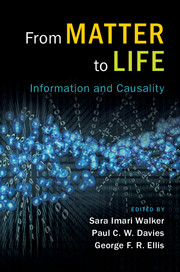Book contents
- Frontmatter
- Contents
- About the authors
- 1 Introduction
- Part I Physics and Life
- Part II Bio from Bit
- Part III Life's Hidden Information
- Part IV Complexity and Causality
- Part V From Matter to Mind
- 16 Major Transitions in Political Order
- 17 Bits from Brains: Analyzing Distributed Computation in Neural Systems
- 18 Machine Learning and the Questions It Raises
- Index
18 - Machine Learning and the Questions It Raises
from Part V - From Matter to Mind
Published online by Cambridge University Press: 02 March 2017
- Frontmatter
- Contents
- About the authors
- 1 Introduction
- Part I Physics and Life
- Part II Bio from Bit
- Part III Life's Hidden Information
- Part IV Complexity and Causality
- Part V From Matter to Mind
- 16 Major Transitions in Political Order
- 17 Bits from Brains: Analyzing Distributed Computation in Neural Systems
- 18 Machine Learning and the Questions It Raises
- Index
Summary
Machine learning is a lively academic discipline and a key player in the continuous pursuit for new technological developments. The editorial in the first issue of the journal Machine Learning, published in March 1986, described the discipline as that field of inquiry concerned with the processes by which intelligent systems improve their performance over time (Langley, 1986). A glossary of terms published in the same journal in 1998 refined this to: Machine Learning is the field of scientific study that concentrates on induction algorithms and on other algorithms that can be said to ‘learn’ (Kohavi and Provost, 1998).
Thomas J. Watson, the brilliant salesman who from 1914 to 1956 oversaw the remarkable growth and success of IBM, serving as both CEO and chairman, was famously quoted as saying in 1943, ‘I think there is a world market for maybe five computers.’ With more than one billion computers now in use worldwide (Virki, 2008), this quote is often referenced to illustrate how vastly their usefulness had been underestimated.No area of computer science is making progress more rapidly than machine learning, with computers being capable of tasks that were a few decades ago only mentioned in science-fiction stories. Watson brought to IBM from his previous employment his trademark motto ‘Think’. It would at the time have been reasonable for Watson to suppose that only humans could really ‘think’. While computers could surpass humans in adding, subtracting, multiplying, and dividing, they were hardly thought of as being good at human tasks, such as playing chess, which required thinking. This begs the question, ‘What is thinking?’ In February 1996 World Chess Champion Garry Kasparov took on the IBM computer Deep Blue in Philadelphia. Even with the IBM engineers allowed to reprogram the computer between games, the world champion won, but only just, losing one game, drawing two, and winning three. His victory was short-lived. The following year he played a rematch. With the score even after the first five of six games, Kasparov allowed Deep Blue to commit a knight sacrifice, which wrecked his Caro–Kann defence and forced him to resign in fewer than twenty moves.
- Type
- Chapter
- Information
- From Matter to LifeInformation and Causality, pp. 468 - 486Publisher: Cambridge University PressPrint publication year: 2017



